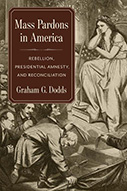Mass Pardons In America: Rebellion, Presidential Amnesty, And Reconciliation

Author: Graham G. Dodds
Publisher: Columbia University Press, 2021. 294 pages
Reviewer: Mark Osler ǀ January 2022
One of the intractable problems with clemency reform work in the United States is a product of short memories: the public’s perception of how the pardon power is used is shaped almost entirely by the experience of the past few decades. People remember Marc Rich, sometimes, or have a vague sense that Donald Trump misused clemency to favor his friends, and people nearly always believe that presidents wait until they are leaving office to grant any clemency. All of this—the self-interested grants, the primacy of abuse, the waiting until the last January—is a radical departure from most of American history, and only dates back to the administration of George H.W. Bush.
The antidote to these false ideas is a strong dose of political history, and that is exactly what Graham G. Dodds gives us in Mass Pardons in America. As a student of clemency, I will keep this book close at hand, right next to Jeffrey Crouch’s The Presidential Pardon Power (2009). Unlike Crouch’s more general work, Dodds focuses on those grants of clemency that are directed towards groups of people who share a common conviction (in both senses of the word). Specifically, Dodds examines four such groups: the participants in the Whiskey Rebellion and Fries Rebellion who received pardons from Presidents Washington and Adams; the Mormons who received clemency from Presidents Buchanan, Harrison, and Cleveland; the Civil War participants who were pardoned by Presidents Lincoln and Johnson; and the Vietnam-era clemency programs under Presidents Ford and Carter.
Appropriately, Dodds leads with history rather than analysis as he investigates each mass clemency. And fascinating history it is. A common thread weaves through each group’s action and the government’s reaction: a resistance to federal power motivates those who are convicted (or threatened with conviction), while the impulse towards clemency comes from a desire for national reconciliation. Dodds is a political scientist, not a lawyer or a historian, so he understandably moves purposefully towards the political impact of these mass clemencies and much of his most important analysis goes to the interaction between clemency grants and politics. He spends little time analyzing court cases, and properly so as this is an area in which tradition, politics, and power play much greater roles than legal precedent.
That core interaction between politics and clemency, according to Dodds, often affected the political fortunes of the participants themselves. For example, Washington was widely acclaimed for his pardons of some of those involved in the Whiskey Rebellion, while Adams suffered fierce blowback to his grants to three leaders of Fries Rebellion. Those clemencies turned Alexander Hamilton against Adams, splitting the Federalists and partially enabling Thomas Jefferson to defeat Adams in the 1800 presidential election. What historically may seem like insignificant clemency grants had outsized political effects.
Dodds later delves into the remarkable interchanges between Presidents Ford and Carter as they created sequential clemency programs to deal with Vietnam War draft evaders and military deserters. Ford initially created a novel clemency board to evaluate conditional pardons, an effort that was later swallowed up by Carter’s unrestricted grant of pardons to most of this same group. Again, this was a political and not a legal dialogue; it marked perhaps the only time that clemency has been a major part of a presidential debate. Dodds details the back-and-forth of that debate in September of 1976, and for anyone who cares about clemency it is a thrilling moment, a rare instance of this key presidential power being seriously addressed in a public forum before an election.
Looking at these mass pardons, so well described by Dodds, it is hard not to contrast the historical record with the timidity of recent presidents. While President Obama granted over 1,700 commutations through a remarkable effort, Presidents George H.W. Bush, Clinton, George W. Bush, and Trump did little of value with the power and are largely remembered for grants of clemency to people most would consider undeserving, a group that includes (but certainly is not limited to) Caspar Weinberger (George H.W. Bush), Marc Rich (Clinton), Scooter Libby (George W. Bush), and most of the recipients on Donald Trump’s list.
In contrast, real courage—and even great political risk—can be seen in the mass pardons at the center of Dodds’ book. Hamilton despised the rebels in Pennsylvania pardoned by Washington, but the President took the risk of alienating a key supporter in making the grants. Similarly, as Dodds reveals, Lincoln’s Attorney General, Edward Bates, believed Lincoln was too forgiving and “unfit to be entrusted with the pardoning power,” and in a time of war, Lincoln’s military commanders were often upset with his grants of clemency to those deserting the ranks (p. 117). This did not deter Lincoln, however—his principles directed his actions, even at the cost of losing the respect of those he counted on to direct the war.
Probably the most striking description of courage in Dodds’ book, though, comes in his description of more recent events. Presidents Ford and Carter chose to grant clemency to those opposed to the Vietnam War, and both met stiff opposition from the military and veterans’ groups. And yet, out of principle, both announced their forgiveness of draft evaders and deserters at… (wait for it)… a national convention of the Veterans of Foreign Wars. Both suspected that such an audience would not receive the project warmly, and they were right. Ford faced stony silence when he described his new Presidential Clemency Board. For Carter (who, like Ford, was a veteran himself) it was even worse—he was loudly booed for over 45 seconds, an outburst that ended only when the national commander gaveled the meeting back to order. And he did this before the election of 1976, knowing full well the reception he was likely to receive. That’s brave.
Such historical detail and an accompanying attention to rhetoric is a principal gift that Mass Pardons in America gives to both scholars and more casual readers. The discussion of presidential rhetoric breaks new ground and serves to emphasize the broader themes of the book. Clemency, as a deeply moral exercise, is particularly worthy of oratory, and Dodds provides examples throughout, including Washington’s description of clemency as a necessary “tenderness” (p. 71). Similarly, it matters to our understanding of Abraham Lincoln that he, in granting a pardon to a deserter condemned to execution, said, “If a man had more than one life, I think a little hanging would not hurt this one; but after he is dead once we cannot bring him back, no matter how sorry we may be, so the boy shall be pardoned” (p. 116). Our world sees too little of this combination of wisdom and humor.
Another common detail drawn out by Dodds (and little considered previously) is the way that most mass clemencies come not in a single grant but in waves over time. Washington’s pardons to those involved in the Whiskey Rebellion followed a far greater number granted by Henry Lee, the Governor of Virginia who served as Washington’s military commander in the conflict. The Civil War clemencies were even more complicated: Abraham Lincoln and Andrew Johnson issued no fewer than six mass pardons to address the effects of the Civil War on national unity. Utah’s Mormons were the recipients of pardons by three presidents over the course of nearly four decades to address the Mormon’s legal exposure to criminal laws involving armed conflict and polygamy, and Vietnam-era offenders were offered successive relief by two presidents. This kind of clemency is not just part of a political dialogue at any one time, but part of a dialectic with predecessors as conditions evolve.
Refreshingly, Dodds continues his discussion to the present day, and expressly relates the lessons of history to the contemporary post-Trump debate over the proper use of the pardon power. Another recent book on clemency, Bernadette Meyler’s Theaters of Pardoning (2019), offers wonderful history and analysis, but nearly nothing to connect those things to our current dilemmas. Dodds, in contrast, goes right at it, suggesting that mass pardons might be considered for groups of people in federal prison or undocumented immigrants. In an epilogue, he even considers the possibility of a mass pardon for the insurrectionists who overran the United States Capitol on January 6, 2021, comparing them to earlier “aggrieved rebels” such as the participants in the Whiskey Rebellion (p. 206).
Clemency for the January 6 insurrectionists, given the continuing threat posed by anti-democratic forces in the United States, seems unlikely. Another group, however, would largely fit the bill: those in federal prison because of the federal ‘war on drugs.’ The groups described by Dodds as historical recipients of mass pardons—insurrectionists in Pennsylvania, Mormon separatists, Confederates after the Civil War, and draft evaders in the Vietnam era—received grants in the wake of real or potential armed conflict. Certainly, the war on drugs, which featured violence and conflict propagated both by the government and those accused of trafficking narcotics, bears some similarity to these other events. Similarly, there is a need for national healing after the heat of battle has passed. Relevant to this is a passage from a Wall Street Journal article quoted by Dodds in relation to the post-Vietnam clemencies: “Presidents through the country’s history have seen fit to grant clemency to rebels or evaders as part of the process of binding the emotional wounds of war. Whatever the injustices, it is a way of putting past divisions behind….” (p. 179). When we get to the point of wanting to put the divisions, racial and otherwise, of the war on drugs behind us, history points to the tool of clemency, elegantly fit to the shape of the president’s hand.
Dodds is an American who teaches at Concordia University in Montreal, Canada. Perhaps his clear-eyed view of clemency’s problems and potential comes from that physical remove from the subject. If so, I am glad for it, and for this contribution to the literature on the Constitution’s most merciful clause.
References
Jeffrey Crouch. 2009. The Presidential Pardon Power. Lawrence, KS: University of Kansas Press
Berndadette Meyler. 2019. Theaters of Pardoning. Ithaca, NY: Cornell University Press.
Mark Osler is the Robert and Marion Short Professor of Law at the University of St. Thomas (MN).


